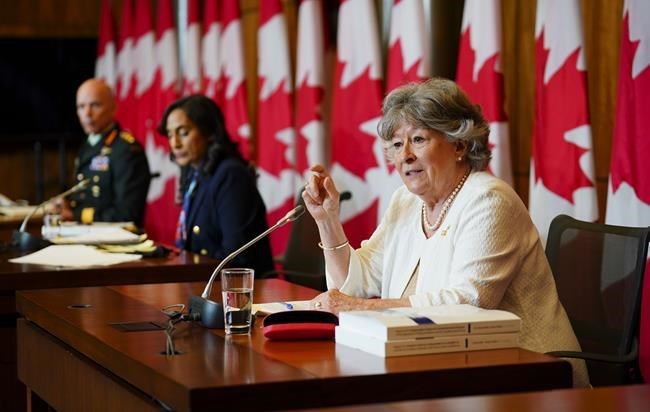
Former Supreme Court Justice Louise Arbour, and Minister of National Defence, Anita Anand, middle, release the final report of the Independent External Comprehensive Review into Sexual Misconduct and Sexual Harassment in the Department of National Defence and the Canadian Armed Forces in Ottawa on Monday, May 30, 2022. Also in attendance is Chief of the Defence Staff, General Wayne Eyre. THE CANADIAN PRESS/Sean Kilpatrick
July 10, 2022 - 4:00 AM
OTTAWA - A dispute between the federal government and provinces over funding and other resources is slowing efforts to transfer military police investigations and prosecutions of alleged sexual crimes to civilian authorities.
Defence Minister Anita Anand said last November the Canadian Armed Forces would start transferring criminal sexual offences to civilian police forces and courts on an interim basis.
The decision followed an interim recommendation from Supreme Court justice Louise Arbour who was in the midst of leading an external review of sexual misconduct and harassment in the Canadian Armed Forces. She said moving the cases from military to civilian police and courts was necessary to address widespread mistrust and doubt about the military’s ability to properly handle such cases.
Provost Marshal Brig.-Gen. Simon Trudeau, the military’s top police officer, reported last month that 22 new investigations and nine pre-existing cases had been accepted by civilian police forces, including the RCMP, municipal police forces in Quebec and some other provinces.
What Trudeau didn't say was that at least 23 cases have been rejected by civilian authorities and remain with military police amid a disagreement between Ottawa and several provinces over funding and other resources.
Anand cited those numbers in a letter last month to Ontario’s then-solicitor general Sylvia Jones as she urged Jones to push police and courts in the province to accept the transfers.
“Our aim is that civilian police services investigate, and civilian courts adjudicate, all Criminal Code sexual offences alleged to have been committed by a CAF member,” Anand wrote in the letter sent June 5.
“The civilian justice system and civilian law enforcement already have jurisdiction over these Criminal Code offences, and I urge you to work to ensure they exercise their jurisdiction and enforce the law.”
Anand's letter made no mention of funding or other federal support despite receiving a letter from Jones three months earlier stressing the need for additional resources to accommodate the military’s cases in Ontario’s “already strained system."
Anand instead said the federal government was looking at permanently removing the military’s jurisdiction over criminal sexual offences — a move that would dump all such investigations and prosecutions in the provinces’ lap.
A spokeswoman for Ontario Solicitor General Michael Kerzner, who took over the portfolio from Jones last month, underscored the provincial government’s assertion that Ottawa needs to provide additional resources to facilitate case transfers.
“This includes the federal government providing concrete data to local police services on cases to be transferred so they are equipped to investigate and pursue potential charges interprovincially and internationally in a manner that is supportive to victims of sexual assault," spokeswoman Hannah Jensen said in an email.
Ontario isn't alone in the request.
A statement from British Columbia's Ministry of Public Safety and Solicitor General also calls for "adequate resources and consistent protocols, procedures and standards to support both the survivors and civilian police."
“We will continue to engage with B.C. policing agencies, victim services and (the) B.C. Prosecution Service as the CAF works towards implementing the transfers of the cases," the statement reads.
In her final report released at the end of May, Arbour noted that some police forces and associations representing chiefs of police had publicly and privately opposed her earlier recommendation for the military to transfer cases to their jurisdictions.
Those included the Ontario Provincial Police, the Ontario Association of Chiefs of Police and its counterpart in British Columbia.
Yet she noted some other provinces and police services had agreed to accept such cases, including Quebec. She went on to argue that based on historical trends, all provinces besides Ontario were likely to see less than 25 additional cases per year.
Ontario was likely to see about 70 new cases but Arbour said those numbers were not a justification for saying no to transferring them.
“The number of cases, spread across the country, with slightly higher volume around CAF bases and wings, and virtually none elsewhere, hardly justifies this refusal to enforce the law,” she said of those opposed to taking military cases.
“The targeted need for additional resources, if any, can be easily identified and accommodated.”
Arbour went on to predict that unless the federal government formally removed the military’s jurisdiction over criminal sexual offences, Ottawa and the provinces would engage in “interminable discussions” between the two sides.
While Provost Marshal spokesman Lt.-Cmdr. James Bresolin says military police continue to handle those cases that civilian counterparts have refused to accept, the situation is raising fresh worries about the impact on victims of sexual crimes.
“The concern for victims is really that there seems to be sort of a hot-potato situation where some of the provinces essentially don't want to take the cases,” said Megan MacKenzie, an expert on military sexual misconduct at Simon Fraser University in B.C.
“Victims are going to be impacted if there's this sort of back and forth between different authorities and potentially under resourcing and disputes about who should be taking care of these cases.”
Charlotte Duval-Lantoine of the Canadian Global Affairs Institute, whose book on military sexual misconduct was published last month, worried for victims who may have come forward only because they thought their cases would not be handled by the Armed Forces.
“That's going to contribute to the re-traumatization of people who have waited decades to come forward.”
This report by The Canadian Press was first published July 10, 2022.
News from © The Canadian Press, 2022